By Nicole Burgoyne · Monday, February 22, 2010 Shannon Mariotti’s article “Damaged Life as Exuberant Vitality in America: Adorno, Alienation, and the Psychic Economy” appears in Telos 149 (Winter 2009): Adorno and America. Nicole Burgoyne follows up with some questions.
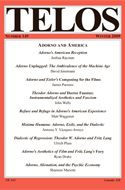 Nicole Burgoyne: One of your main concerns with psychoanalysis as it developed in America in the postwar era is that it accepted a commercialized and materialistic view of happiness as an ideal. One can see how this sort of obsession with living life to the fullest is at odds with Freud’s early work toward curing suffering individuals and his later theories on the repressive nature of society in general. Do you see this uniquely American form of psychoanalysis, which Adorno characterizes as the loss of the individual experience, as related to his critique of America’s culture industry? Why are these phenomena prominent in American culture as opposed to elsewhere? Nicole Burgoyne: One of your main concerns with psychoanalysis as it developed in America in the postwar era is that it accepted a commercialized and materialistic view of happiness as an ideal. One can see how this sort of obsession with living life to the fullest is at odds with Freud’s early work toward curing suffering individuals and his later theories on the repressive nature of society in general. Do you see this uniquely American form of psychoanalysis, which Adorno characterizes as the loss of the individual experience, as related to his critique of America’s culture industry? Why are these phenomena prominent in American culture as opposed to elsewhere?
Continue reading →
By Philip Crone · Tuesday, February 16, 2010 Each Tuesday in the TELOSscope blog, we reach back into the archives and highlight an article whose critical insights continue to illuminate our thinking and challenge our assumptions. Today, Philip Crone looks at Aryeh Botwinick’s “Same/Other versus Friend/Enemy: Levinas contra Schmitt,” from Telos 132 (Fall 2005).
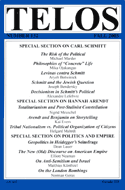 Representative Joe Wilson’s outburst during President Obama’s speech to Congress on healthcare reform in some ways overshadowed the content of the speech itself. Had Wilson shouted out in another, non-American context, such as during the Prime Minister’s Question Time in the United Kingdom, he would have received little notice. But with an eye to the protocol and tradition surrounding presidential addresses to Congress in the United States, commentators from both the left and the right lambasted Wilson’s actions. Of course, Wilson was not without his supporters who seemed to have little concern for such protocols, or at least seemed to think that the gravity of the situation warranted violating the traditional standards. Still, Wilson’s yell stood in stark contrast to the lines offered at the end of Obama’s speech in which the President called for “[replacing] acrimony with civility.” Representative Joe Wilson’s outburst during President Obama’s speech to Congress on healthcare reform in some ways overshadowed the content of the speech itself. Had Wilson shouted out in another, non-American context, such as during the Prime Minister’s Question Time in the United Kingdom, he would have received little notice. But with an eye to the protocol and tradition surrounding presidential addresses to Congress in the United States, commentators from both the left and the right lambasted Wilson’s actions. Of course, Wilson was not without his supporters who seemed to have little concern for such protocols, or at least seemed to think that the gravity of the situation warranted violating the traditional standards. Still, Wilson’s yell stood in stark contrast to the lines offered at the end of Obama’s speech in which the President called for “[replacing] acrimony with civility.”
Continue reading →
By Timothy Stacey · Tuesday, February 9, 2010 Each Tuesday in the TELOSscope blog, we reach back into the archives and highlight an article whose critical insights continue to illuminate our thinking and challenge our assumptions. Today, Timothy Stacey looks at Paul Gottfried’s “Enforcing ‘Human Rights’: Rejoinder to Rick Johnstone” and Alain de Benoist’s “What is Sovereignty?” both from Telos 116 (Summer 1999).
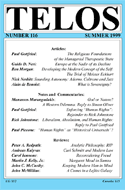 As Tony Blair remains a prime candidate for the EU presidency, despite (or, knowing Blair, in spite of) the protestations of his former adversaries at home, it is high time to pose the question of sovereignty in relation to the central enforcement of human rights. And this for four reasons: first, as Prime Minister of Britain, Blair showed little or no respect for localism, preferring the efficiency of top-down reforms from education to policing. If he cared little for provincial politics as the nation’s leader, what is to say he will care for national politics as the continent’s leader? Second, and as a means to achieving this centrism, Blair flouted parliamentary constraints on his leadership. With the EU checks on central control as lackadaisical as they have proved to be in recent years, all it requires is a maverick like Blair to go trampling through the fine red tape that protects national sovereignty. Third, Blair is an unashamed Europhile, in the past proving quite happy to give up his own nation’s sovereignty in the name of EU global clout. Fourth and finally, Blair is the champion of liberal interventionism. Whatever the discrepancy between his excuse for invading Iraq and his reason for staying it through, it is no secret that heavier on Blair’s conscious is whether Iraq was a ripe case for liberal intervention—not whether he lied to the British people. Before Blair becomes a new-age Charlemagne, it is worth assessing the case of sovereignty with respect to human rights. As Tony Blair remains a prime candidate for the EU presidency, despite (or, knowing Blair, in spite of) the protestations of his former adversaries at home, it is high time to pose the question of sovereignty in relation to the central enforcement of human rights. And this for four reasons: first, as Prime Minister of Britain, Blair showed little or no respect for localism, preferring the efficiency of top-down reforms from education to policing. If he cared little for provincial politics as the nation’s leader, what is to say he will care for national politics as the continent’s leader? Second, and as a means to achieving this centrism, Blair flouted parliamentary constraints on his leadership. With the EU checks on central control as lackadaisical as they have proved to be in recent years, all it requires is a maverick like Blair to go trampling through the fine red tape that protects national sovereignty. Third, Blair is an unashamed Europhile, in the past proving quite happy to give up his own nation’s sovereignty in the name of EU global clout. Fourth and finally, Blair is the champion of liberal interventionism. Whatever the discrepancy between his excuse for invading Iraq and his reason for staying it through, it is no secret that heavier on Blair’s conscious is whether Iraq was a ripe case for liberal intervention—not whether he lied to the British people. Before Blair becomes a new-age Charlemagne, it is worth assessing the case of sovereignty with respect to human rights.
Continue reading →
By Etel Sverdlov · Tuesday, February 2, 2010 Each Tuesday in the TELOSscope blog, we reach back into the archives and highlight an article whose critical insights continue to illuminate our thinking and challenge our assumptions. Today, Etel Sverdlov looks at Rick Johnstone’s “Ethnic Purges and Neighborly Pacts: Reflections on a Swiss Statue,” from Telos 115 (Spring 1999).
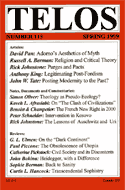 Optimism can never be overrated. It is simply too easy, when examining the world with a keen eye, to become lost within daily strife. For this reason, I found Rick Johnstone’s article “Ethnic Purges and Neighborly Pacts: Reflections on a Swiss Statue” particularly refreshing. Within his text, he traces the development and achievements of Switzerland, emphasizing the modesty of their political ambitions as one of the causes for their success. What saturates the article, however, more than anything, is a committed positive outlook concerning the Swiss. Johnstone glories in their pacifism and applauds them for their tolerance. When analyzing national policy, most people judge countries by what they have accomplished; Johnstone, on the other hand, steps through the looking glass and rejoices in what the Swiss have not done. And what they have not done is a lot. He points out with satisfaction the lack of war monuments to the fallen of World War I in Swiss villages: they had no desire to die by machine-gun fire in the muddy trenches. He emphasizes their invisibility on the political scene: “People jest that no one knows who is the President of Switzerland. . . . If no one knows who the President of Switzerland is, that is because it does not matter, and if it does not matter, that is not because Switzerland is not a success, but because it is, and because its success comes not from above, but from below.” He praises the most useless weapon of war, the Swiss Army Knife—a symbol, with its miniature corkscrew and scissors, of self-reliance and autonomy. Optimism can never be overrated. It is simply too easy, when examining the world with a keen eye, to become lost within daily strife. For this reason, I found Rick Johnstone’s article “Ethnic Purges and Neighborly Pacts: Reflections on a Swiss Statue” particularly refreshing. Within his text, he traces the development and achievements of Switzerland, emphasizing the modesty of their political ambitions as one of the causes for their success. What saturates the article, however, more than anything, is a committed positive outlook concerning the Swiss. Johnstone glories in their pacifism and applauds them for their tolerance. When analyzing national policy, most people judge countries by what they have accomplished; Johnstone, on the other hand, steps through the looking glass and rejoices in what the Swiss have not done. And what they have not done is a lot. He points out with satisfaction the lack of war monuments to the fallen of World War I in Swiss villages: they had no desire to die by machine-gun fire in the muddy trenches. He emphasizes their invisibility on the political scene: “People jest that no one knows who is the President of Switzerland. . . . If no one knows who the President of Switzerland is, that is because it does not matter, and if it does not matter, that is not because Switzerland is not a success, but because it is, and because its success comes not from above, but from below.” He praises the most useless weapon of war, the Swiss Army Knife—a symbol, with its miniature corkscrew and scissors, of self-reliance and autonomy.
Continue reading →
By Marcus Michelsen · Tuesday, January 19, 2010 Each Tuesday in the TELOSscope blog, we reach back into the archives and highlight an article whose critical insights continue to illuminate our thinking and challenge our assumptions. Today, Marcus Michelsen looks at Valerie Allen and Ares Axiotis’s article “Nietzsche on the Future of Education,” from Telos 111 (Spring 1998).
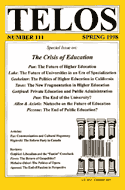 If someone were to ask me the question “What is authoritative?” I might as well say, “I am. What I give my assent to has authority in my life.” Though true if one admits that for authority to manifest itself it must be recognized by someone, and for something to become authoritative in my life it requires just such a manifestation to me; still, this turns the question around. If I am pursued by the following question “How do I recognize what I should assent to?” the Enlightenment provides me with the answer: “Reason. Reason has authority in our lives. History itself testifies to the reason that formed it in the decisions of great men and in freedom, the spirit of the people. Moreover, to be enlightened means precisely to be in possession of reason.” There are, however, reasons to suppose that such an answer is suspicious, and that the Enlightenment, by glorifying itself, leads us astray. What if, in the belief that authority comes from reason, we have got it wrong? If someone were to ask me the question “What is authoritative?” I might as well say, “I am. What I give my assent to has authority in my life.” Though true if one admits that for authority to manifest itself it must be recognized by someone, and for something to become authoritative in my life it requires just such a manifestation to me; still, this turns the question around. If I am pursued by the following question “How do I recognize what I should assent to?” the Enlightenment provides me with the answer: “Reason. Reason has authority in our lives. History itself testifies to the reason that formed it in the decisions of great men and in freedom, the spirit of the people. Moreover, to be enlightened means precisely to be in possession of reason.” There are, however, reasons to suppose that such an answer is suspicious, and that the Enlightenment, by glorifying itself, leads us astray. What if, in the belief that authority comes from reason, we have got it wrong?
Continue reading →
By Timothy Stacey · Tuesday, January 12, 2010 Each Tuesday in the TELOSscope blog, we reach back into the archives and highlight an article whose critical insights continue to illuminate our thinking and challenge our assumptions. Today, Timothy Stacey looks at Luciano Pellicani’s article “Was Fascism Revolutionary?” from Telos 122 (Winter 2002).
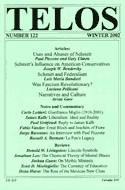 With wave after wave of Islamic extremist attacks across the globe in the last decade, two schools of thought have begun to emerge: the idealist and the realist. The idealist school says that Islam is dangerous; the realist school claims that economic deprivation is the chief cause of terrorism. Both schools are based on the presupposition that liberalism itself has nothing inherently provocative about it. Crucially, both sides ignore that liberalism can of itself be offensive—not because, as some media pundits suggest, its values are hard to swallow, but because it strictly has no values. There is something distinctly inhuman to this aspect of liberalism that is alienating to those that are new to the liberal rationale. With wave after wave of Islamic extremist attacks across the globe in the last decade, two schools of thought have begun to emerge: the idealist and the realist. The idealist school says that Islam is dangerous; the realist school claims that economic deprivation is the chief cause of terrorism. Both schools are based on the presupposition that liberalism itself has nothing inherently provocative about it. Crucially, both sides ignore that liberalism can of itself be offensive—not because, as some media pundits suggest, its values are hard to swallow, but because it strictly has no values. There is something distinctly inhuman to this aspect of liberalism that is alienating to those that are new to the liberal rationale.
Continue reading →
|
|
 Nicole Burgoyne: One of your main concerns with psychoanalysis as it developed in America in the postwar era is that it accepted a commercialized and materialistic view of happiness as an ideal. One can see how this sort of obsession with living life to the fullest is at odds with Freud’s early work toward curing suffering individuals and his later theories on the repressive nature of society in general. Do you see this uniquely American form of psychoanalysis, which Adorno characterizes as the loss of the individual experience, as related to his critique of America’s culture industry? Why are these phenomena prominent in American culture as opposed to elsewhere?
Nicole Burgoyne: One of your main concerns with psychoanalysis as it developed in America in the postwar era is that it accepted a commercialized and materialistic view of happiness as an ideal. One can see how this sort of obsession with living life to the fullest is at odds with Freud’s early work toward curing suffering individuals and his later theories on the repressive nature of society in general. Do you see this uniquely American form of psychoanalysis, which Adorno characterizes as the loss of the individual experience, as related to his critique of America’s culture industry? Why are these phenomena prominent in American culture as opposed to elsewhere?  Representative Joe Wilson’s outburst during President Obama’s speech to Congress on healthcare reform in some ways overshadowed the content of the speech itself. Had Wilson shouted out in another, non-American context, such as during the Prime Minister’s Question Time in the United Kingdom, he would have received little notice. But with an eye to the protocol and tradition surrounding presidential addresses to Congress in the United States, commentators from both the left and the right lambasted Wilson’s actions. Of course, Wilson was not without his supporters who seemed to have little concern for such protocols, or at least seemed to think that the gravity of the situation warranted violating the traditional standards. Still, Wilson’s yell stood in stark contrast to the lines offered at the end of Obama’s speech in which the President called for “[replacing] acrimony with civility.”
Representative Joe Wilson’s outburst during President Obama’s speech to Congress on healthcare reform in some ways overshadowed the content of the speech itself. Had Wilson shouted out in another, non-American context, such as during the Prime Minister’s Question Time in the United Kingdom, he would have received little notice. But with an eye to the protocol and tradition surrounding presidential addresses to Congress in the United States, commentators from both the left and the right lambasted Wilson’s actions. Of course, Wilson was not without his supporters who seemed to have little concern for such protocols, or at least seemed to think that the gravity of the situation warranted violating the traditional standards. Still, Wilson’s yell stood in stark contrast to the lines offered at the end of Obama’s speech in which the President called for “[replacing] acrimony with civility.”  As Tony Blair remains a prime candidate for the EU presidency, despite (or, knowing Blair, in spite of) the protestations of his former adversaries at home, it is high time to pose the question of sovereignty in relation to the central enforcement of human rights. And this for four reasons: first, as Prime Minister of Britain, Blair showed little or no respect for localism, preferring the efficiency of top-down reforms from education to policing. If he cared little for provincial politics as the nation’s leader, what is to say he will care for national politics as the continent’s leader? Second, and as a means to achieving this centrism, Blair flouted parliamentary constraints on his leadership. With the EU checks on central control as lackadaisical as they have proved to be in recent years, all it requires is a maverick like Blair to go trampling through the fine red tape that protects national sovereignty. Third, Blair is an unashamed Europhile, in the past proving quite happy to give up his own nation’s sovereignty in the name of EU global clout. Fourth and finally, Blair is the champion of liberal interventionism. Whatever the discrepancy between his excuse for invading Iraq and his reason for staying it through, it is no secret that heavier on Blair’s conscious is whether Iraq was a ripe case for liberal intervention—not whether he lied to the British people. Before Blair becomes a new-age Charlemagne, it is worth assessing the case of sovereignty with respect to human rights.
As Tony Blair remains a prime candidate for the EU presidency, despite (or, knowing Blair, in spite of) the protestations of his former adversaries at home, it is high time to pose the question of sovereignty in relation to the central enforcement of human rights. And this for four reasons: first, as Prime Minister of Britain, Blair showed little or no respect for localism, preferring the efficiency of top-down reforms from education to policing. If he cared little for provincial politics as the nation’s leader, what is to say he will care for national politics as the continent’s leader? Second, and as a means to achieving this centrism, Blair flouted parliamentary constraints on his leadership. With the EU checks on central control as lackadaisical as they have proved to be in recent years, all it requires is a maverick like Blair to go trampling through the fine red tape that protects national sovereignty. Third, Blair is an unashamed Europhile, in the past proving quite happy to give up his own nation’s sovereignty in the name of EU global clout. Fourth and finally, Blair is the champion of liberal interventionism. Whatever the discrepancy between his excuse for invading Iraq and his reason for staying it through, it is no secret that heavier on Blair’s conscious is whether Iraq was a ripe case for liberal intervention—not whether he lied to the British people. Before Blair becomes a new-age Charlemagne, it is worth assessing the case of sovereignty with respect to human rights.  Optimism can never be overrated. It is simply too easy, when examining the world with a keen eye, to become lost within daily strife. For this reason, I found Rick Johnstone’s article “Ethnic Purges and Neighborly Pacts: Reflections on a Swiss Statue” particularly refreshing. Within his text, he traces the development and achievements of Switzerland, emphasizing the modesty of their political ambitions as one of the causes for their success. What saturates the article, however, more than anything, is a committed positive outlook concerning the Swiss. Johnstone glories in their pacifism and applauds them for their tolerance. When analyzing national policy, most people judge countries by what they have accomplished; Johnstone, on the other hand, steps through the looking glass and rejoices in what the Swiss have not done. And what they have not done is a lot. He points out with satisfaction the lack of war monuments to the fallen of World War I in Swiss villages: they had no desire to die by machine-gun fire in the muddy trenches. He emphasizes their invisibility on the political scene: “People jest that no one knows who is the President of Switzerland. . . . If no one knows who the President of Switzerland is, that is because it does not matter, and if it does not matter, that is not because Switzerland is not a success, but because it is, and because its success comes not from above, but from below.” He praises the most useless weapon of war, the Swiss Army Knife—a symbol, with its miniature corkscrew and scissors, of self-reliance and autonomy.
Optimism can never be overrated. It is simply too easy, when examining the world with a keen eye, to become lost within daily strife. For this reason, I found Rick Johnstone’s article “Ethnic Purges and Neighborly Pacts: Reflections on a Swiss Statue” particularly refreshing. Within his text, he traces the development and achievements of Switzerland, emphasizing the modesty of their political ambitions as one of the causes for their success. What saturates the article, however, more than anything, is a committed positive outlook concerning the Swiss. Johnstone glories in their pacifism and applauds them for their tolerance. When analyzing national policy, most people judge countries by what they have accomplished; Johnstone, on the other hand, steps through the looking glass and rejoices in what the Swiss have not done. And what they have not done is a lot. He points out with satisfaction the lack of war monuments to the fallen of World War I in Swiss villages: they had no desire to die by machine-gun fire in the muddy trenches. He emphasizes their invisibility on the political scene: “People jest that no one knows who is the President of Switzerland. . . . If no one knows who the President of Switzerland is, that is because it does not matter, and if it does not matter, that is not because Switzerland is not a success, but because it is, and because its success comes not from above, but from below.” He praises the most useless weapon of war, the Swiss Army Knife—a symbol, with its miniature corkscrew and scissors, of self-reliance and autonomy.  If someone were to ask me the question “What is authoritative?” I might as well say, “I am. What I give my assent to has authority in my life.” Though true if one admits that for authority to manifest itself it must be recognized by someone, and for something to become authoritative in my life it requires just such a manifestation to me; still, this turns the question around. If I am pursued by the following question “How do I recognize what I should assent to?” the Enlightenment provides me with the answer: “Reason. Reason has authority in our lives. History itself testifies to the reason that formed it in the decisions of great men and in freedom, the spirit of the people. Moreover, to be enlightened means precisely to be in possession of reason.” There are, however, reasons to suppose that such an answer is suspicious, and that the Enlightenment, by glorifying itself, leads us astray. What if, in the belief that authority comes from reason, we have got it wrong?
If someone were to ask me the question “What is authoritative?” I might as well say, “I am. What I give my assent to has authority in my life.” Though true if one admits that for authority to manifest itself it must be recognized by someone, and for something to become authoritative in my life it requires just such a manifestation to me; still, this turns the question around. If I am pursued by the following question “How do I recognize what I should assent to?” the Enlightenment provides me with the answer: “Reason. Reason has authority in our lives. History itself testifies to the reason that formed it in the decisions of great men and in freedom, the spirit of the people. Moreover, to be enlightened means precisely to be in possession of reason.” There are, however, reasons to suppose that such an answer is suspicious, and that the Enlightenment, by glorifying itself, leads us astray. What if, in the belief that authority comes from reason, we have got it wrong?  With wave after wave of Islamic extremist attacks across the globe in the last decade, two schools of thought have begun to emerge: the idealist and the realist. The idealist school says that Islam is dangerous; the realist school claims that economic deprivation is the chief cause of terrorism. Both schools are based on the presupposition that liberalism itself has nothing inherently provocative about it. Crucially, both sides ignore that liberalism can of itself be offensive—not because, as some media pundits suggest, its values are hard to swallow, but because it strictly has no values. There is something distinctly inhuman to this aspect of liberalism that is alienating to those that are new to the liberal rationale.
With wave after wave of Islamic extremist attacks across the globe in the last decade, two schools of thought have begun to emerge: the idealist and the realist. The idealist school says that Islam is dangerous; the realist school claims that economic deprivation is the chief cause of terrorism. Both schools are based on the presupposition that liberalism itself has nothing inherently provocative about it. Crucially, both sides ignore that liberalism can of itself be offensive—not because, as some media pundits suggest, its values are hard to swallow, but because it strictly has no values. There is something distinctly inhuman to this aspect of liberalism that is alienating to those that are new to the liberal rationale. 

